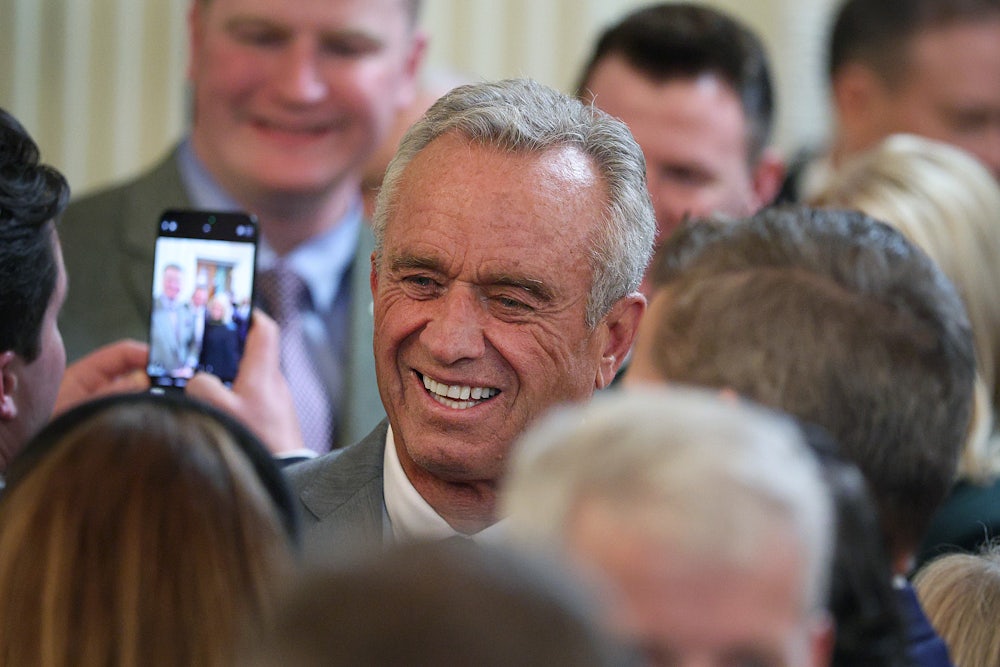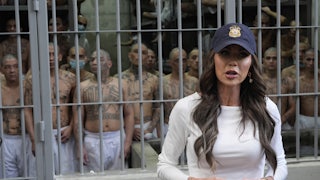Last week, an 8-year-old girl became the second child and the third person to die of measles in the current outbreak. But it was Robert F. Kennedy Jr., the secretary of health and human services, who dominated the news cycle.
“The most effective way to prevent the spread of measles is the MMR vaccine,” Kennedy wrote on X on Sunday afternoon. It was hailed as his strongest endorsement of measles vaccination yet. But in his next post, a few hours later, Kennedy praised two controversial doctors’ unproven treatments for measles, making no mention of vaccines. On Thursday, he followed that up by saying on Fox News that “we need to do better at treating kids who have this disease, and not just saying the only answer is vaccination.”
This type of framing makes it sound like families have two equal options for dealing with measles. “It provides a false equivalency—it says you can either get vaccinated or you can be treated with these unproven interventions,” Peter Hotez, dean for the National School of Tropical Medicine at Baylor College of Medicine, told me. Instead, “his rhetoric should be on one thing and one thing only; it should be all hands on deck, in terms of launching a catch-up vaccination campaign and explaining to parents the vital importance of getting vaccinated,” Hotez said. “That’s the only way you can prevent this epidemic from accelerating, and it’s the only way you can hope to contain it. And there’s no other intervention.”
Children’s Health Defense, the anti-vaccine organization helmed by Kennedy until recently, has made claims even wilder than the health secretary’s—even seeming to argue that it’s the hospital killing kids, not measles. CHD claimed in March that the first child died as a result of “medical error” because doctors gave her certain antibiotics instead of their preferred antibiotics for a secondary bacterial infection that developed during her measles illness. (Measles itself is a viral illness. Antibiotics will not treat it, though antibiotics can treat bacterial infections that develop as a result of the primary illness.) In reality, that type of secondary infection isn’t fatal, and it’s not what killed the little girl. Measles did. Even so, other anti-science quacks are echoing the same argument, with one doctor who rose to prominence by spreading Covid-19 misinformation asserting the second girl died from being “improperly medically managed.”
This isn’t anti-vaxxers squabbling at the fringes; these are conversations that are driving the Texas outbreak forward and apparently informing the federal response to measles. It has implications not just for Texas but for the entire country. Health workers in Texas told me that parents are waiting until children are severely ill before they bring them to the hospital. Meanwhile, they’re trying unproven remedies, including toxic doses of vitamin A—which puts sick children at grave risk and does nothing to halt the virus as it tears through communities.
One of Kennedy’s first moves as health secretary was opening yet another inquiry into whether there’s a connection between vaccines and autism—a long-discredited theory that caused vaccination rates to drop. On Thursday, Kennedy said those results were expected to be made public in the fall: “By September, we will know what has caused the autism epidemic and we will be able to eliminate those exposures.” It seems to be a chilling allusion to the way vaccines are coming under attack, while also spreading stigma and fear about autism.
All of this means the U.S. is now at risk of losing its measles-eliminated status—and we’re at risk of having to deal with outbreaks like these regularly, as new misinformation proliferates from the highest levels.
While Kennedy wrote, in his Sunday afternoon post encouraging vaccines, that “the growth rates for new cases and hospitalizations have flattened,” after federal resources were sent to Texas in early March, cases are in fact rising quickly—and more are likely going undetected.
The outbreak in Texas has risen to 541 known cases and 56 hospitalizations. The two children who died in Texas had no previous health conditions, other than being unvaccinated. The outbreak has also spread to New Mexico, where 58 people have tested positive, four have been hospitalized, and one has died; to Oklahoma, with 12 known cases; and possibly to Kansas, which has identified 32 cases and one hospitalization since March 13.
“It’s a pretty serious, massive measles epidemic,” Hotez said. The fact that two school-aged kids have died in Texas, and another person in New Mexico died after measles infection, also suggests that the current numbers are likely undercounted. “There could easily be 1,000 cases or more,” he said—and this outbreak “still has a lot of energy behind it.”
In his post on Sunday evening, Kennedy posted photos where he posed, smiling, with the two grieving families and one family whose daughter recovered after three weeks in the intensive care unit. While he didn’t mention that 2-year-old survivor’s doctors or detail the care she received in the hospital, he did single out “two extraordinary healers,” Richard Bartlett and William “Ben” Edwards, who he claimed have “treated and healed” about 300 Mennonite children sickened by measles in Texas, using inhaled budesonide and clarithromycin.
About those “healers”: In 2003, Richard Bartlett allegedly gave five of his patients risky medications, including powerful intravenous antibiotics, without weighing the harms of the treatment, according to a complaint to the Texas State Board of Medical Examiners, which found Bartlett was “not practicing medicine in a manner consistent with public health and welfare.” Bartlett reached a settlement with the board, without admitting to wrongdoing, by agreeing to undergo additional medical training and to submit to temporary oversight of his work.
As for the two treatments Kennedy highlighted: Aerosolized budesonide is an asthma treatment. While it might help measles patients who also have asthma, it’s unlikely to help and could even hurt sick kids without asthma, doctors told me. Clarithromycin is an antibiotic usually not used in children; while it can treat secondary bacterial infections that arise after respiratory illnesses, an antibiotic will not help with a viral illness—and a deadly virus like measles is the primary concern, even as doctors treat secondary illnesses as well.
“Sometimes we do need to add other types of medications,” Elizabeth Murray, a pediatric emergency medicine physician at the University of Rochester, told me. “However, saying we can treat measles with an antibiotic is a misleading approach” because it won’t treat the “underlying” illness of measles, she said. And doctors need to take great care with matching bacterial infections to the most effective antibiotics. “We try to be very diligent and vigilant about using antibiotics because of resistance that can be built up if we just give people antibiotics kind of willy-nilly,” said Murray.
Claiming that hundreds of children received these treatments and recovered, Murray said, is an example of survivor bias: “If we’re taking a sample of people who don’t need to be hospitalized, their outcomes are going to be different than people who are sick enough to be in the hospital.” Without full information about their illnesses, “we can’t make accurate conclusions” about the role of the unproven treatments, she said.
It is good that Kennedy is finally talking about the importance of getting vaccinated with the MMR shot, Hotez said. “But it comes after he put out a lot of head-scratching information about budesonide and vitamin A and clarithromycin, and he needs to walk that back in a more explicit way.”
In March, soon after their daughter, Kayley, became the first child in the U.S. to die of measles in a decade, Peter and Eva Fehr went on camera to talk about their experiences with the Children’s Health Defense. “We would absolutely not take the MMR [vaccine],” said Eva Fehr. “The measles wasn’t that bad; they [other children] got over it pretty quickly. And Dr. Edwards was there for us.”
“He was amazing. He was great,” Peter Fehr said.
“Don’t do the shots,” Eva added through a translator. “There’s doctors that can help with measles.”
It might be easy to interpret their words as carelessness about their child’s death. Their other four children survived; on the whole, measles wasn’t that bad. But Peter and Eva Fehr are genuinely grieving their daughter’s death; several times, they paused the interview as tears rolled down their cheeks.
Instead, they seem to place the blame on the doctors who treated Kayley in the hospital. They contrast her treatment, where she was placed on a ventilator, with their other children’s, who got better after taking Edwards’ treatment regimen. It’s a clear, heartbreaking example of how survivor bias, fueled by misinformation, leads to exactly the wrong conclusion that there are other, better options for measles beyond vaccination and hospital care. The ventilator or a lack of antibiotics didn’t lead to Kayley’s death; the virus that made her sick enough to need a ventilator did. The other children survived because they were lucky enough to avoid such a severe infection in the first place. And the video, distributed by a leading anti-vaccine organization, may do untold harm in communities around the globe.
How much harm Kennedy himself may do by promoting these doctors and treatments is hard to predict. “I don’t know, because I don’t know that we’ve ever seen anything like this before,” Murray said.
To battle misinformation, people need to have good relationships with trusted medical providers and understand how to “weed through this firehose of stuff that comes at us on social media,” Murray said. “If it’s scare tactics being used instead of facts, then it’s very easy to be misled.” Even so, “the overwhelming majority of families throughout our nation are choosing to vaccinate themselves and their children,” Murray pointed out.
More than walking back his statements on unproven treatments, Kennedy needs to reverse his yearslong stance on thoroughly discredited links between vaccines and autism, Hotez said. “This is a disproven link. We’ve been at this for 25 years. We have multiple studies showing vaccines don’t cause autism in all the different forms that they allege, and we have a lack of plausibility, because autism begins through the action of autism genes that we’ve identified through early fetal brain development.”
As health secretary, Kennedy “needs to finally end his insistence on looking at vaccines and autism—that’s causing parents to be hesitant about getting vaccinated,” Hotez said. Instead, going by his statements this week, Kennedy seems to be doubling down.








